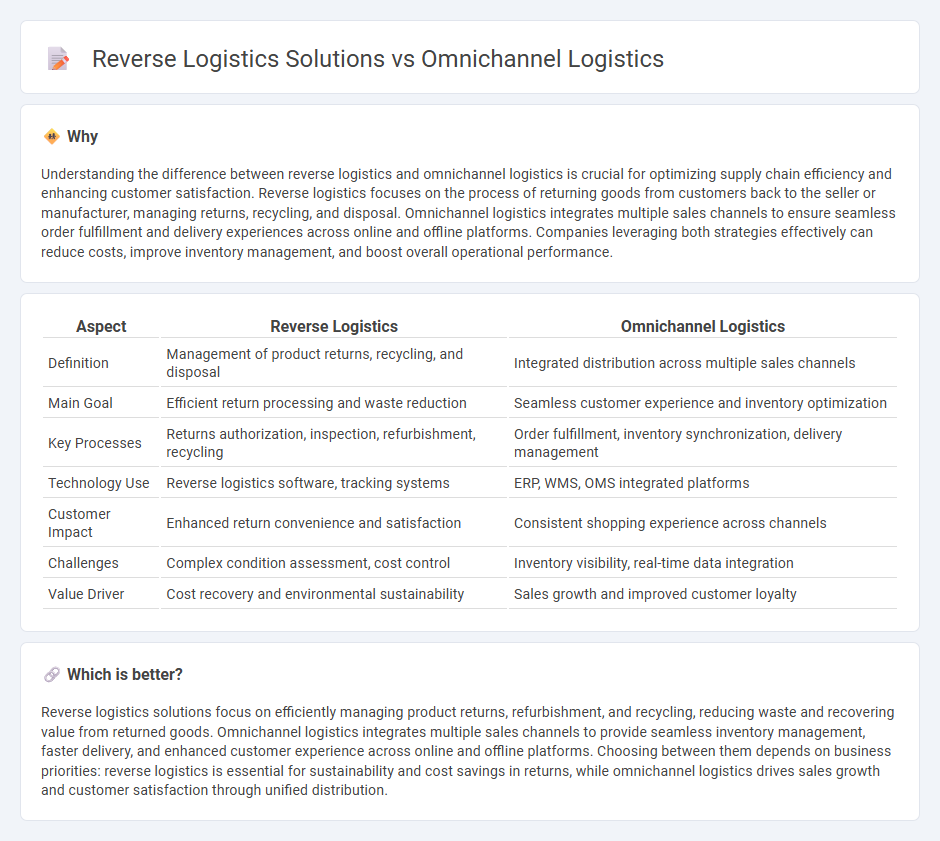
Reverse logistics focuses on the efficient return, recycling, and disposal of products, optimizing cost savings and sustainability efforts. Omnichannel logistics integrates multiple sales channels to provide seamless delivery, inventory management, and customer experience. Explore how these logistics strategies enhance supply chain resilience and customer satisfaction.
Why it is important
Understanding the difference between reverse logistics and omnichannel logistics is crucial for optimizing supply chain efficiency and enhancing customer satisfaction. Reverse logistics focuses on the process of returning goods from customers back to the seller or manufacturer, managing returns, recycling, and disposal. Omnichannel logistics integrates multiple sales channels to ensure seamless order fulfillment and delivery experiences across online and offline platforms. Companies leveraging both strategies effectively can reduce costs, improve inventory management, and boost overall operational performance.
Comparison Table
| Aspect | Reverse Logistics | Omnichannel Logistics |
|---|---|---|
| Definition | Management of product returns, recycling, and disposal | Integrated distribution across multiple sales channels |
| Main Goal | Efficient return processing and waste reduction | Seamless customer experience and inventory optimization |
| Key Processes | Returns authorization, inspection, refurbishment, recycling | Order fulfillment, inventory synchronization, delivery management |
| Technology Use | Reverse logistics software, tracking systems | ERP, WMS, OMS integrated platforms |
| Customer Impact | Enhanced return convenience and satisfaction | Consistent shopping experience across channels |
| Challenges | Complex condition assessment, cost control | Inventory visibility, real-time data integration |
| Value Driver | Cost recovery and environmental sustainability | Sales growth and improved customer loyalty |
Which is better?
Reverse logistics solutions focus on efficiently managing product returns, refurbishment, and recycling, reducing waste and recovering value from returned goods. Omnichannel logistics integrates multiple sales channels to provide seamless inventory management, faster delivery, and enhanced customer experience across online and offline platforms. Choosing between them depends on business priorities: reverse logistics is essential for sustainability and cost savings in returns, while omnichannel logistics drives sales growth and customer satisfaction through unified distribution.
Connection
Reverse logistics solutions enhance omnichannel logistics by efficiently managing product returns, refurbishments, and recycling across multiple sales channels. Integrating reverse logistics into omnichannel systems reduces waste, lowers operational costs, and improves customer satisfaction by streamlining return processes. Effective coordination between forward and reverse supply chains ensures seamless inventory management and supports sustainable business practices.
Key Terms
**Omnichannel Logistics:**
Omnichannel logistics integrates multiple sales channels, including physical stores, e-commerce, and mobile platforms, to ensure seamless inventory management, order fulfillment, and customer delivery experiences. It leverages advanced technologies like warehouse automation, real-time tracking, and AI-driven demand forecasting to optimize supply chain efficiency across all touchpoints. Discover how omnichannel logistics can transform customer satisfaction and operational agility for your business.
Inventory Synchronization
Omnichannel logistics integrates inventory synchronization across multiple sales channels, ensuring real-time stock visibility and seamless order fulfillment. Reverse logistics solutions focus on managing returns and exchanges efficiently, often requiring accurate inventory updates to maintain balance between forward and backward flows. Explore how advanced inventory synchronization enhances both omnichannel and reverse logistics performance for optimized supply chain management.
Multi-channel Fulfillment
Omnichannel logistics integrates inventory management, order processing, and delivery across multiple sales channels to ensure seamless multi-channel fulfillment, enhancing customer satisfaction through faster and more accurate deliveries. Reverse logistics solutions focus on the efficient management of product returns, refurbishments, and recycling, reducing waste and improving sustainability in the supply chain. Explore innovative strategies to optimize both omnichannel logistics and reverse logistics for a comprehensive multi-channel fulfillment approach.
Source and External Links
Omnichannel Shipping Strategies - Omnichannel logistics is a strategy managing inventory from one supplier location to multiple channels, aiming to reduce costs, improve transit times, and provide seamless customer experiences across both online and physical stores.
What is Omnichannel Logistics - Omnichannel logistics integrates many sales channels (including online, physical shops, social media) to provide flexible warehouse management, better inventory availability, and enhanced customer understanding, optimizing overall service at reduced costs.
What Is Omnichannel Logistics & Delivery? What Are The ... - Omnichannel logistics allows products to be purchased via multiple channels with integrated fulfillment options (in-store pickup, home delivery, same-day delivery) to give customers flexibility, real-time order visibility, and an improved, consistent delivery experience.
 dowidth.com
dowidth.com